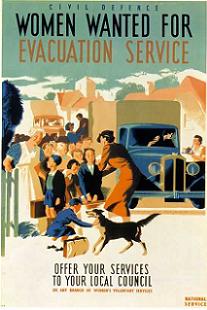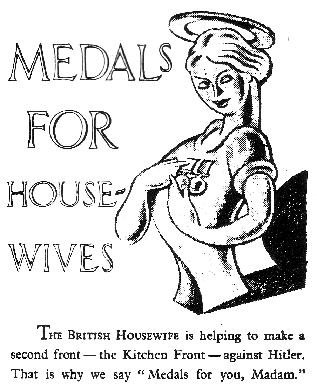In 1939, the
average housewife hardly knew a calorie from a
protein; by the end of the war, to the delight, if
embarrassment of the Minister of Food, she was
writing angrily to complain if her corner-shop was
failing to provide her family's share of
body-building and energy-giving foods..
Norman
Longmate, How we lived then (1973)
A
history book based on the author's huge collection
of people's memories.
|
Links
The
'HistoryLearning' site - basic
info
BBC site - excellent
Imperial War Museum site
 Film clips
Film clips
Blackpool memories
The
1940s House
WWII fashions
Brenda
Wood's memories

The Aycliffe
Angels |
|
In 1939, women made up more than half of
the population - a proportion which grew, of course, as
more and more men went abroad on active service.
It is important to realise that 'the part women played
in the war' was not just about the things they did
specially. Everything that happened on the
Home Front happened at least equally to women; women
were involved in almost EVERY aspect of the war.
It was the women who had to:
|
Source
A
I
believe that
women are bearing the brunt of this home-fronted
war... And I see everywhere ... very
little sign that the women's point of view matters
nearly as much as the man's. This war is
being led by men and run by men, mostly old men.
They are appallingly ignoring women's problems.
Comment to Mass
Observation survey of Industrial and Personnel
Management (1939).
|
|
Evacuation
• take
their children to the station, wave them off, and
bear most of the emotional pain of the parting.
 • (pregnant women and
mothers with babies were evacuated themselves) cope
with all the difficulty of living in another woman's house
according to another woman's standards. • (pregnant women and
mothers with babies were evacuated themselves) cope
with all the difficulty of living in another woman's house
according to another woman's standards.
• bear the brunt of the
extra cleaning, bed-wetting, cooking and problems in
the host homes.
|
 Source B
Source B
When war started I was
in the Royal Infirmary having an operation, and my
husband came in and said, "the kiddies had been
taken away"..., so I broke my heart crying and I
said "where are they?" He said "I don't
know where they've gone." So any road
the nurses all come round me and gave me a cup of
tea and I said "I want to know where they are" and
he said "I don't know where they are", he said
"they've just gone." So when I came out
of hospital, I was on two sticks, I went up to
Betws-y-Coed. I found out where they
were, (they were there for six weeks)....
When I went up to see them they were in a little
alleyway, you know a little porch house, in the
teams of rain. I said "out, home". I had
to bring them home.
Emily Banks, a
Liverpool mother during the war
|
|
Home Life
• keep the home going and bring up the children while
the men were away fighting.
• do ALL the things
previously done by their husbands (e.g. the garden/
the decorating) AS WELL AS everything they had done
before the war - the war changed the balance of roles
within the marriage (although many things returned to
how they had been after the war).
• cope with the absence (or
often the death) of a husband or boyfriend.
Sexual moral standards changed.
• 1.5 million American GIs
were stationed in Britain in the run up to D-Day, and
15,000 of them married English girls in 1944 and 600
GI brides went to live in America in 1946 (many of
these marriages did not work). In all,
perhaps 70,000 English girls became pregnant by
American soldiers.
|
Source C
The war was the best thing that ever happened to us.
I was as green as grass and terrified if anyone
spoke to me... At work you did exactly as
your boss told you; then you went home to do exactly
what your husband told you. The war
changed all that. The war made me stand
on my own two feet..
Mona Marshall, a
nursemaid who had become a steelworker during the
war, said this in 1986.
|
|
Rationing
• queue for the groceries, the butcher's, (and
after an air raid) for washing and water etc..
• learn how to cook interesting and nutritious meals
on rations without essentials such as flour or lard.
• wear 'utility clothing'
(which used a minimum of cloth - so no frills or
turn-ups)
• 'make do and mend' socks,
skirts etc. Women unravelled old woollens and
knitted new clothes, or made new coats out of old
blankets. Women's magazines gave hints to
women how to use cup hooks and bottle tops to make
jewellery, use bicarbonate of soda as under-arm anti-perspirant,
burnt cork as mascara and Reckitt's Blue (a laundry
whitener) to give grey hair a 'blue rinse'.
The greatest prize was an enemy parachute - it could
be used to make some silk knickers.
• get 'new' clothes from
swap shops.
• do without nylons (women
used gravy browning with a eyebrow pencil-line drawn down
the back of the leg as the 'seam') and without
make-up.
• 'grow their own' in
allotments or their gardens.
|
Source D
Food is running very short this week, a little
cheese, no tea, no meat to be had. I
think there is a hold-up in transport, but
undoubtedly hunger is the least of things we will
have to face before this war is over.
Diary of Moyra
Charlton of Essex for 3 January 1941.
|
|
Blitz and Air Raid Precautions
• make the blackout curtains
(and close them every
night), tape up the window panes etc.
• sit pumping air into their baby's gas mask - if
they stopped (and some did) the baby suffocated.
• bear the brunt of
the Blitz. In Coventry women took their
children to sleep
in the fields for fear of bombing. It was
women and children who made up the majority of people
who slept in the Underground.
• after an air raid, clear up the mess.
• go without sleep - many
women stayed up during the night because the men had
to go to work in the daytime.
• help with the civil
defence services during the raids; women drove
ambulances, worked as telephone operators or despatch
riders, did fire-watching and worked as ARP wardens
and nurses.
• volunteer for the Women's Voluntary
Service (WVS) - in 1939, 10,000 women a week joined;
they set up tea canteens in bombed areas, looked after
shock victims, helped with First Aid and manned
Incident Enquiry posts.
|
Source E
The mother had spent most of the night trying to
keep the child asleep. The father had
wanted to take over her job but she told him she
could sleep while he was at work whereas he would
grumble because his work wasn't done properly.
As a result the father had 4 or 5 hours of genuine
sleep. The mother is worst affected but
makes the best of it: 'I'm lucky. I
manage to get an hour or two in the afternoon'.
Mass
Observation Survey.
|
|
Work
• go out to work - as Mass
Observation showed that 97% of women thought that
women should go out to work to help the war effort.
• In 1941, the government
started to conscript single women aged 20-30 into war
work - in the Auxiliary Services or industry.
Married women were encouraged to volunteer.
• live in hostels because
they were conscripted into industries in a different
part of the country.
• do dangerous work filling
shells (e.g. the Aycliffe Angels).
• put up with dirty and
inappropriate conditions in factories (many factory
toilets, where men had worked, for instance, did not
have doors)
• join the Women's Land
Army to help farmers whose labourers had joined up -
about 80,000 women became 'Land Girls', of whom 1,000
worked as rat-catchers, and 6,000 joined the WLA
Timber Corps.
• cope with children AND a
job when the husband is away on active service.
• try to do the shopping
AFTER finishing work at 5pm when all the shops had
closed.
• manage on much less than
the men were being paid for the same job - AND suffer
the hostility of the men who thought they were taking
away men's jobs and helping to depress men's wages.
|
Source F
I was seriously
concerned myself as our factory is an old shabby
place and its sanitary arrangements of a very low
standard. Our canteen is not good.
Lavatory accommodation such as most factory hands
use without a qualm will revolt these girls.
Comment of a
factory manager to Mass
Observation.

The film
Land Girls (1997) glamorises the role of the
Women's Land Army. |
Source G

A poster put out by
the Ministry of Food. 'Medals' were awarded
for thing such as 'making delicious dishes from
home-grown vegetables', 'trying fresh-salted cod',
'acting on recipes and hints from Kitchen Front wireless
talks', 'saving all bread crumbs ... and making crisp
rusks', and 'going without, rather than pay unfairly
high prices for foods that may be scarce'.
|
Source H

A propaganda poster
encouraging women to go to work. |
|
Fight
• in the Auxiliary
Territorial Service (ATS) - on ack-ack guns,
search-lights, and radar control, a swell as doing
sentry duty and servicing trucks and motorbikes.
• in the Women's Auxiliary
Air Force (WAAF) - doing sentry duty, manning the
radio, directing planes to landing and take-off -
women pilots were only allowed to deliver new planes
to airfields, however; they were NOT allowed to go
into combat.
• in the Women's Royal
Naval Service (WRNS - 'the Wrens') - where they
overhauled torpedoes and depth charges, repaired mine
sweepers, learned morse code and semaphore.
• for the First Aid Nursing
Yeomanry (FANY) - driving ambulances and staff `cars
in battle areas, and doing some nursing on the
front-line.
• about 2000 women worked
on ULTRA - the group at Bletchley Park which decoded
enemy messages.
• some few heroic women
worked as spies, radioing back information, and
co-ordinating supplies of weapons to the Resistance
fighters in occupied France.
• Other women worked for
ENSA (the group of actors and singers set up to
entertain the troops) - Vera Lynn was perhaps the most
famous.
|
Source I
The war affected women
enormously. The war effort required
their participation and co-operation in every aspect
of their lives...
By 1942 more men, women and children had been killed
at home than soldiers in action.
Caroline Lang, Keep Smiling Through: Women in the
Second World War (i989)
One of a
series of school textbooks: Women in History,
about the part women have played in the past.
|